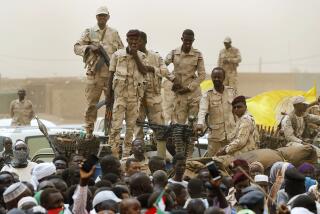Standoff tests Sudan’s 2005 peace accord
JUBA, SUDAN — A political standoff between Sudan’s ruling party and former southern rebels who share power in a coalition government is testing the strength of their U.S.-brokered peace agreement that ended a 21-year civil war in Africa’s largest nation.
A flurry of high-level meetings in recent days between leaders of the National Congress Party, which has held power in Sudan since a 1989 military coup, and the Sudan People’s Liberation Movement has failed to resolve a crisis triggered Oct. 11 when the former rebels suspended their participation in the government.
The SPLM accuses the ruling party, led by President Omar Hassan Ahmed Bashir, of failing to implement key provisions of the Comprehensive Peace Agreement signed in 2005. Among other things, the former rebels say, the party has refused to remove northern troops from southern oil regions, missed a recent deadline to begin a census in preparation for elections in 2009 and rejected a commission’s ruling on the fate of the Abyei region, where as much as 70% of Sudan’s oil is produced.
Though the Sudanese president agreed to southern demands for a Cabinet reshuffle, he and other officials in the Arab-dominated National Congress Party have refused to negotiate on other issues.
They insist that 90% of the peace agreement has been implemented, including a 50-50 split of oil revenue. They have accused the SPLM of political grandstanding and have urged southern ministers to resume their posts.
A meeting scheduled for Wednesday between Bashir and First Vice President Salva Kiir, chairman of the SPLM, was canceled, officials said.
“The crisis is getting deeper,” SPLM Secretary-General Pagan Amum said. If progress toward a resolution is not made in coming days, the SPLM is vowing to organize demonstrations in Khartoum, the capital, working with other opposition parties in the north.
“We can make Khartoum ungovernable,” Amum said.
In Washington, Secretary of State Condoleezza Rice said she was concerned about the fate of the 2005 accord, which is considered a hallmark of the Bush administration’s efforts in Africa.
“It’s something that we really must make work,” she said during an appearance before the House Foreign Affairs Committee. She criticized the “behavior of the north” and said she planned to seek an additional $70 million in aid for development in Sudan’s south.
Despite the impasse in talks, both sides have expressed a desire to avoid resumption of the civil war, which killed up to 2 million people and displaced an additional 4 million.
“Our movement has fought for freedom and equality,” Kiir told reporters in Juba on Monday. “It remains committed to the peace accord and will never return to war.”
But the dispute is taking the fragile alliance into uncharted waters, posing significant risks for both parties, analysts said.
The SPLM is betting it can pressure Bashir and rally the support of the international community, whose attention over the last two years has drifted toward the separate conflict in Darfur, in western Sudan. But if the standoff lingers, southerners might scare away international investment in their region and risk the collapse of the peace accord, which includes a much-cherished right to hold a referendum on independence in 2011.
“The question is: How long can the SPLM afford to stay out of the government,” said one Western diplomat, speaking on condition of anonymity due to the sensitivity of the issue.
In addition, Bashir’s party controls distribution of oil proceeds and provides southerners with most of the funds used to run their regional government.
For the president, who is already under fire over his handling of Darfur, another high-profile dispute would probably increase international pressure and raise the specter of more economic sanctions. The U.S. has imposed sanctions against the country.
The current clash is the culmination of two years of rising tensions between Bashir’s party and the SPLM.
“We are saying enough is enough,” said John Andruga Duku, the SPLM’s head of mission in Nairobi, Kenya. “We can’t continue to pretend that everything is OK.”
He said the SPLM had little to lose by suspending participation in the government because its ministers were given no control over policy, staff or budgets. “We were just a rubber stamp,” he said.
Shortly after helping to form the coalition government in 2005, SPLM founder John Garang died in a helicopter crash, leaving southerners in disarray. Analysts say Kiir initially adopted a more conciliatory approach that made it easier for Khartoum leaders to take advantage.
“Now southerners are getting tougher, and it’s long overdue,” said Robert O. Collins, author and longtime Sudan analyst.
As part of its more aggressive stance, the SPLM also is taking an active role in the Darfur conflict, where an estimated 200,000 people have died since 2003. In the past, southerners expressed support for the Darfur rebels but rarely expended political currency toward resolving the crisis. Now the SPLM is holding a Darfur rebel conference in Juba and warning that peace in western Sudan cannot be achieved without fulfillment of the north-south accord.
The SPLM is also looking to strengthen ties with other critics of the Bashir government, perhaps in preparation for the 2009 elections.
“We have a common enemy,” said Clement Janda, an SPLM official who is mediating the Darfur rebel talks in Juba. “This could be the actualization of the alliance between the south and Darfur. And Khartoum is very nervous about it.”
--
More to Read
Sign up for Essential California
The most important California stories and recommendations in your inbox every morning.
You may occasionally receive promotional content from the Los Angeles Times.









